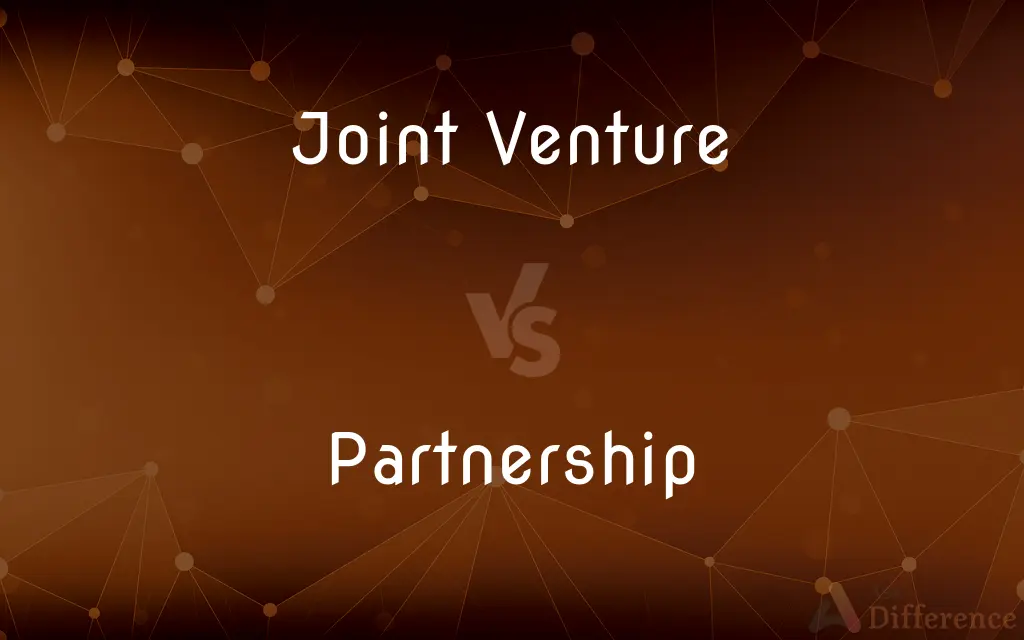Joint Venture vs. Partnership — What's the Difference?
By Tayyaba Rehman — Published on November 10, 2023
Joint Venture and Partnership involve collaboration but differ in duration and scope; Joint Ventures are generally for a specific project and time, whereas Partnerships typically entail a broader, ongoing collaboration.

Difference Between Joint Venture and Partnership
Table of Contents
ADVERTISEMENT
Key Differences
A Joint Venture typically involves two or more entities coming together for a specific project or for a defined period. Joint Ventures are commonly formed when companies wish to enter new markets, share knowledge, or manage risks together, thereby distributing both responsibilities and benefits among themselves. On the other hand, a Partnership represents a broader alliance where two or more parties agree to work together, often indefinitely, sharing profits, losses, and control of the business.
In a Partnership, each partner is generally liable for the debts and obligations of the business. Partnerships usually lack a specified time frame and can pertain to the overall business operations, not just a single project or objective. Alternatively, Joint Ventures are often project-specific and have a clear end date, upon which the collaboration is evaluated or terminated.
Joint Ventures also typically allow entities to retain their individual identities and operate separately outside of the joint initiative. This means that the companies involved remain distinct and the Joint Venture represents a separate business entity or effort. Partnerships tend to involve a more unified approach where the businesses, particularly in a general partnership, are seen as a single entity and might not maintain as distinct operations.
The legal and financial structure of a Partnership and a Joint Venture can also vary significantly. Joint Ventures may involve the creation of a new entity to manage and operate the venture, while partnerships often function as a single business entity, sharing assets, liabilities, and operations among all partners. Thus, the accountability and profit-sharing mechanisms inherently differ between them.
In essence, while both Joint Ventures and Partnerships are collaborative business structures that involve shared interests and benefits, they diverge primarily in their scope, duration, legal structure, and the nature of the collaboration. The former is generally more limited and project-specific, while the latter involves a more integrated, ongoing relationship.
ADVERTISEMENT
Comparison Chart
Definition
A business agreement for a specific project/period
A long-term, ongoing business relationship
Duration
Typically limited and project-specific
Usually ongoing and indefinite
Entity
Can be a separate entity
Often operates as a single entity
Liability
Limited to the venture
Partners generally share liability
Management
Managed by representatives from each entity
Managed by partners according to agreement
Compare with Definitions
Joint Venture
A business arrangement between two or more parties to undertake a specific project together.
The two tech companies formed a joint venture to develop the new software.
Partnership
An alliance where parties agree to cooperate for mutual benefits in a business.
Their partnership allowed them to combine resources and expand their customer base.
Joint Venture
A temporary partnership among businesses for a specific task or project.
The joint venture between the corporations successfully launched the innovative product.
Partnership
A relationship where participants willingly engage in coordinated efforts to achieve shared objectives.
The partnership between the NGO and the corporation aimed to address environmental issues.
Joint Venture
An agreement that allows entities to work together without forming a new organization.
The international joint venture allowed the companies to expand their global reach.
Partnership
A cooperative arrangement between parties, characterized by mutual interests and shared benefits.
The strategic partnership between the companies enhanced their market positioning.
Joint Venture
A collaboration where entities create a new business entity to pursue a defined objective.
The automotive manufacturers established a joint venture to explore electric vehicle production.
Partnership
A legal form of business operation between two or more individuals who share management and profits.
The law firm expanded its services through a partnership with a consultancy.
Joint Venture
A strategic alliance where parties share resources, risks, and rewards for a particular goal.
The joint venture enabled the firms to pool their resources and expertise for the infrastructure project.
Partnership
A business structure where profits, losses, and responsibilities are shared among the involved parties.
The retail partnership successfully blended the strengths of each participating business.
Partnership
The state of being a partner.
Partnership
A business entity in which two or more co-owners contribute resources, share in profits and losses, and are individually liable for the entity's actions.
Partnership
The persons participating in such a business entity.
Partnership
A relationship between individuals or groups that is characterized by mutual cooperation and responsibility, as for the achievement of a specified goal
Neighborhood groups formed a partnership to fight crime.
Partnership
The state of being associated with a partner.
Partnership
An association of two or more people to conduct a business
Forge a partnership
Partnership
(cricket) The period when two specific batsmen are batting, from the fall of one wicket until the fall of the next; the number of runs scored during this period,
Partnership
The state or condition of being a partner; as, to be in partnership with another; to have partnership in the fortunes of a family or a state.
Partnership
A division or sharing among partners; joint possession or interest.
Rome, that ne'er knew three lordly heads before,First fell by fatal partnership of power.
He does possession keep,And is too wise to hazard partnership.
Partnership
An alliance or association of persons for the prosecution of an undertaking or a business on joint account; a company; a firm; a house; as, to form a partnership.
Partnership
A contract between two or more competent persons for joining together their money, goods, labor, and skill, or any or all of them, under an understanding that there shall be a communion of profit between them, and for the purpose of carrying on a legal trade, business, or adventure.
Partnership
The members of a business venture created by contract
Partnership
A contract between two or more persons who agree to pool talent and money and share profits or losses
Common Curiosities
What are common reasons for forming a joint venture?
To share costs and risks, combine expertise, access new markets, or secure resources.
Is a joint venture a separate legal entity?
Not always. A joint venture can operate as a separate legal entity or as a contractual agreement without forming a new entity.
How is a joint venture different from a partnership?
A joint venture is typically for a specific project or period, while a partnership is a continuous business relationship.
Can a partnership have a separate legal identity?
In some jurisdictions, partnerships can have a separate legal identity, like LLPs (Limited Liability Partnerships). However, traditional general partnerships don't have a separate legal existence from their partners.
What is a joint venture?
A joint venture is a business arrangement where two or more parties agree to pool their resources to accomplish a specific task or project.
Are partners personally liable for business debts?
In general partnerships, partners are typically personally liable for business debts. However, in limited partnerships, only general partners are personally liable, while limited partners have limited liability.
What is a partnership?
A partnership is a business arrangement where two or more individuals or entities share ownership, responsibilities, risks, and rewards of a business.
Can both joint ventures and partnerships be informal?
Yes, but it's advisable to have written agreements to clarify terms, avoid disputes, and provide legal protections.
Which is more flexible, a joint venture or partnership?
Both can be flexible depending on the agreement. However, joint ventures tend to be more project-specific, while partnerships are broader and ongoing.
Can joint ventures have different structures?
Yes, they can be structured as corporations, partnerships, or just contractual agreements, depending on the legal and operational needs.
How is profit or loss distributed in a partnership?
This depends on the partnership agreement. Typically, it's distributed according to the partners' agreed-upon shares or ratios.
Are there tax differences between joint ventures and partnerships?
It can vary by jurisdiction. Generally, both are pass-through entities, meaning profits and losses pass through to owners/partners. However, the specific tax implications depend on the structure and local regulations.
Is the duration the same for joint ventures and partnerships?
Not necessarily. Joint ventures often have a set duration for a specific project, while partnerships are typically ongoing.
Can a joint venture turn into a partnership or vice versa?
Yes, depending on the evolving objectives and interests of the involved parties, a joint venture can transition into a partnership or a partnership might create a joint venture for specific projects.
Share Your Discovery

Previous Comparison
Sugar Paste vs. Gum Paste
Next Comparison
BMR vs. RMRAuthor Spotlight
Written by
Tayyaba RehmanTayyaba Rehman is a distinguished writer, currently serving as a primary contributor to askdifference.com. As a researcher in semantics and etymology, Tayyaba's passion for the complexity of languages and their distinctions has found a perfect home on the platform. Tayyaba delves into the intricacies of language, distinguishing between commonly confused words and phrases, thereby providing clarity for readers worldwide.












































